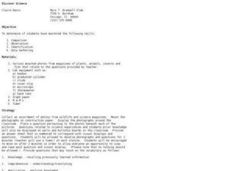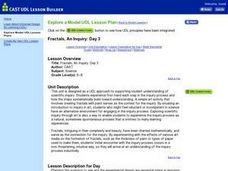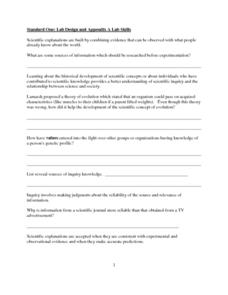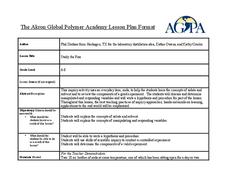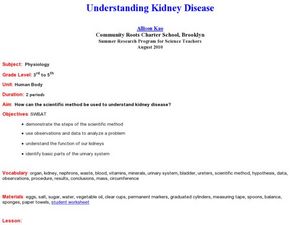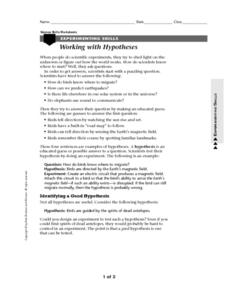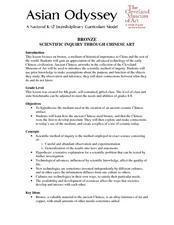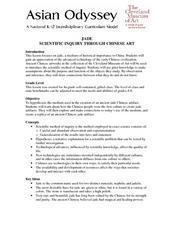Curated OER
Tracking Weather Over Time
Students gather, analyze and interpret data. They explain scientific inquiry. They plot points on a map and report information from a spatial perspective.
Curated OER
Discover Science
Students practice scientific research skills. In this lesson about science, students gain experience with the following skills: comparison, observation, identification, and data gathering. Students will go from station to station and...
Curated OER
Fractals, An Inquiry: Day 3
Students develop questions for their inquiries and plan their experiments. They are supported by a modeled case study of Max the Dog's Inquiry Planning Process, as well as supported by a planning template, The Inquiry Organizer.
Curated OER
Standard One: Lab Design and Appendix A Lab Skills
In this lab design and lab skills worksheet, students answer questions about experimental design including finding variables, determining controls, and graphing data. They answer questions about microscopy and label the parts of a...
Curated OER
Study the Fizz
Students experiment to determine which bottle of soda has more dissolved carbon dioxide. In this solutions lesson, students use the scientific method to test the amount of carbon dioxide in bottles of soda. They identify and explain the...
Curated OER
Catapults
Students test catapults. In this physics lesson, student conduct scientific investigations that require them to test catapults. Students practice their problem solving skills as they employ the use of the scientific method.
Curated OER
Understanding Kidney Disease
Students experiment to determine information about kidney function. In this kidney function lesson, students use the scientific method to experiment with eggs, water, salt, sugar, and vegetable oil to simulate kidney function. They...
Curated OER
Non-Compressibility of Water
Students will observe a property of water. For this inquiry-based properties of air lesson, students observe how a change in water pressure impacts the positioning of an eye-dropper in the water container and they make hypotheses about...
Curated OER
Rusting and the Scientific Method
Pupils observe the oil can scene with the tin man from a clip from "The Wizard of Oz" and answer the question, "What can we learn about rust from this scene?". They take 2 tubes and 2 nails, adding 1 salt packet to 2 ml of distilled...
Science 4 Inquiry
The Classification of Living Things
It's a classification sensation! Demystify why we classify using an inquiry activity that helps your class sort things out. Groups begin by classifying a variety of shoes before they research organisms and design their own dichotomous...
NASA
Cosmic Microwave Background
Begin your next class with a BANG! Pupils discuss the formation of our universe and its expansion before proceeding with an activity designed to demonstrate what most likely occurred billions of years ago. They conclude with a discussion...
Curated OER
It Counts
Students classify and compare plants using specific information, observations, and numbers. For this mathematical inquiry lesson, students use plant characteristics to describe, compare, and classify them. They attempt to develop a...
NASA
What’s the Problem with Isotropy?
Some patterns are so small, we can't see them without the help of technology. The same is true for cosmic microwave background radiation. During this activity and discussion, scholars examine both anisotropic and isotropic items and...
American Chemical Society
Forming a Precipitate
Things are getting a little slippery in an inquiry-based lesson studying precipitates. Learners use soap and Alka-Seltzer tablets to create different mixtures with water. They then study the properties of the mixtures including their...
American Chemical Society
What Makes it Rain?
Clouds come alive when curious minds create rain in an action-packed activity. Scholars view a video of rain and analyze an image of water uses to generate a class discussion leading into a hands-on exploration. Using a set of...
Curated OER
Introduction to the Scientific Method
Learners participate in an experiment and learn to record it using the scientific method. In this biodegradable plastics lesson, students follow the scientific method to complete an inquiry. Learners complete an experiment with a fish...
Curated OER
Working With Hypotheses
In this science worksheet, students examine the topic in order to solidify knowledge covered in the curriculum using puzzles and creative games.
Curated OER
Diaper Inquiry
Fifth graders carefully examine and investigate the products contained in a diaper. They particularly analyze the crystal sodium polyacrylate, a product developed for use in astronaut diapers. They follow the scientific method, forming...
Curated OER
A Novel Study Unit for The Cay
Novelly written questions are perfect for a novel study guide unit on The Cay. The well-rounded resource contains an anticipation guide for scholars to complete before reading, a variety of questions per chapter of the book, and a post...
Curated OER
Measure for Measure: Time & Temperature
Students examine scientific inquiry. In this time and temperature lesson plan students create a template to solve scientific problems and work through a science problem.
Curated OER
Bronze: Scientific Inquiry through Chinese Art
Learners examine the use of bronze and porcelain in Chinese art and commerce through in-class activities, role play events, and small-group discussions in this exciting Social Studies/Arts instructional activity.
Curated OER
Paper: Scientific Inquiry Through Chinese Art
Students create replicas of Chinese hanging scrolls in an attempt to understand the technology behind the creation and use of paper in Ancient China. This three-day lesson includes enrichment ideas.
Curated OER
Jade: Scientific Inquiry Through Chinese Art
Students discover the uses of Jade in Chinese art and society through in-class discussions, group projects, and internet research. Additional enrichment activities are included.
Curated OER
Inquiry and the Nature of Science
High schoolers identify questions that can be answered through scientific investigations, design and conduct a scientific investigation. They also use appropriate tools and techniques to gather, analyze, and interpret data.



